WATERBERG WISHES
Babohi shows how veld-to-table works
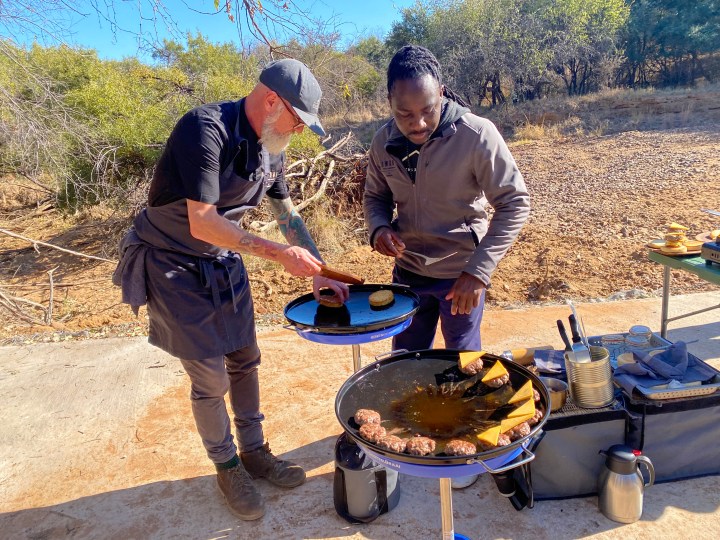
We were treated to two major sightings in a morning within the Waterberg’s Qwabi private game reserve. One was an elephant, the other, surprisingly, a chef.
Sighting an elephant for breakfast, then finding chef Chris Erasmus of Foliage cooking on a skottel in the veld. There were many more of course but these were my two wonders of this Waterberg experience. Both my wishes had just come true in early and quick succession.
It was my father’s birthday. In memory of him every year I play, not I Spy exactly, but I Will Spy. This morning the challenge was an elephant. I’m not always in a game reserve for his birthday but it has happened a surprising amount of times. In other places, I often play the game with cloud shapes.
When I woke and had made a hot drink, I sat on the bed watching this bushveld beauty of a day dawning along the whole wall length of sliding glass doors, upstairs in my rather lovely Leopard 2 suite lodgings at Babohi. Out there was a vast Wes Anderson set, as though pasted onto the other side of the glass, much too perfect and almost 2D. In those colours. By that early Anderson-pink light, I hatched the elephant “some time today” sighting challenge. No one had mentioned the word “elephant” yet; nothing on yesterday’s game drive. I knew there wasn’t a lot of them in the entire Qwabi reserve, not like the many giraffe, rhinos, hippos, cheetahs, eland, lions, buffalo, oryx and even aardvark and brown hyenas.
At six I’d golf-carted up the hill to the Babohi Lodge restaurant for an excellent coffee and a just-baked, real buttery croissant for pre-breakfast. This morning the theme for all the pastries and fruit servings on display, even at that hour, had been French. Everything, I already knew, is made right here in this kitchen from scratch.
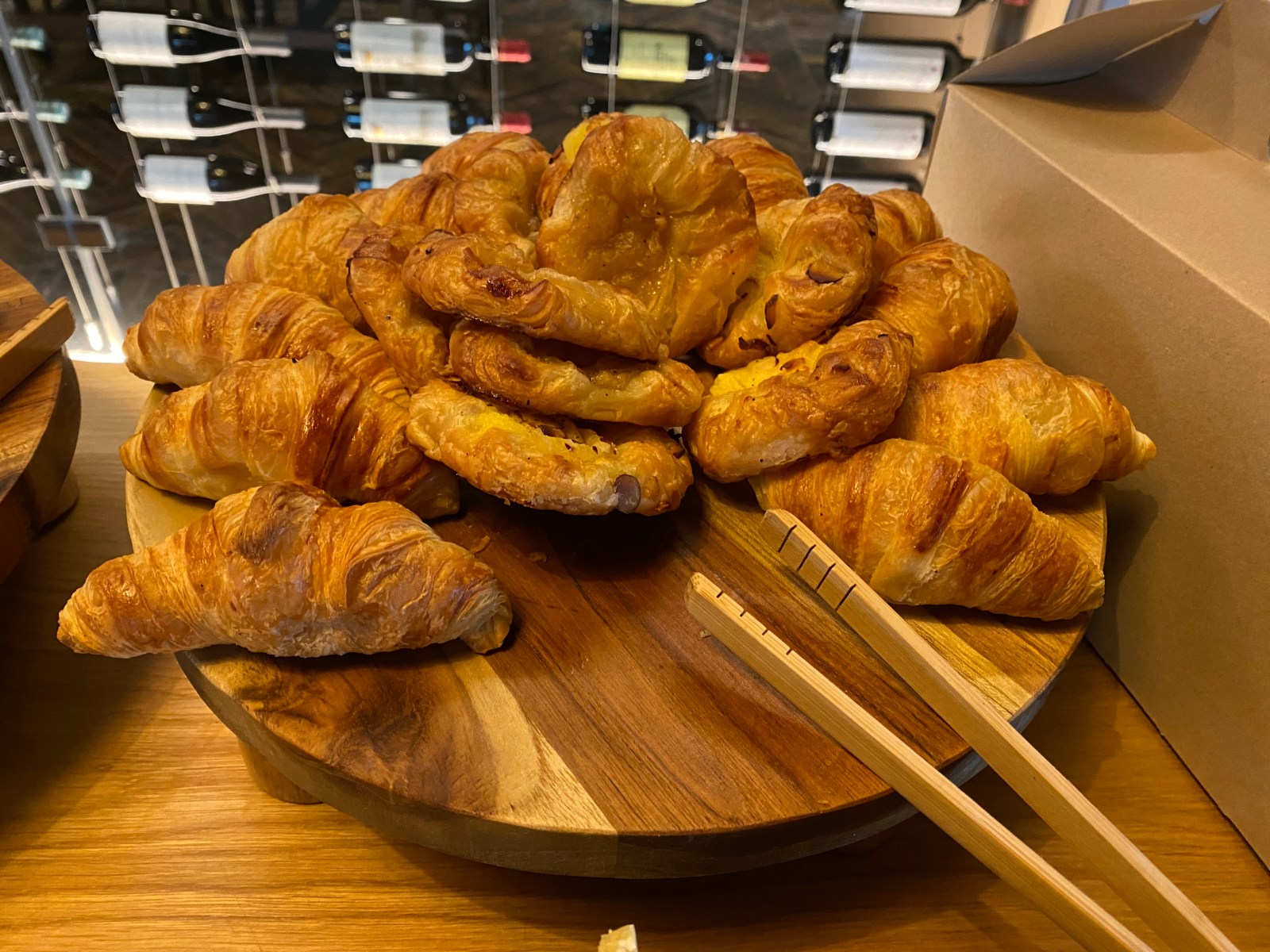
Everything is made right here in this kitchen from scratch. (Photo: Marie-Lais Emond)
Half an hour later a group of six of us had been whooshing through the ford entrance, or exit in that case, beginning our morning game drive. On arrival and to and from yesterday afternoon’s game drives, we’d surged through it as well. I love hearing that gear change and then watching the slow waves and the sound made by the game vehicle forging through the water.
Babohi, the name of this particular lodge is associated with water and there’s a lot of it about. A super-long pool — my best sort for real swims though, sadly, this super-freezing week is definitely not the weather for them, warmed as the pool may be — extends beyond the restaurant building. At the entrance to the building, you cross a kind of moat over more water. I’ve been noticing all the interesting visual detail here.
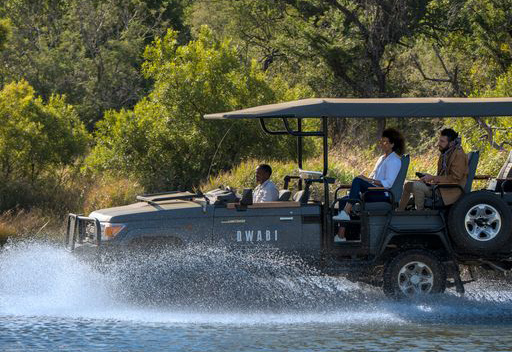
I love hearing that gear change and then watching the slow waves made by the game vehicle forging through the water. (Photo: Supplied)
In the blue mist over the first dam we came to, Jonathan van Zyl, our field guide, spotted hippos underwater, maybe walking under there as he said. They surfaced while the mist lifted to reveal eight or nine. I’ve always found it to be a lucky day when the good thing is so immediate.
We were still talking about bush fortune as we left the lower dam. Jonathan leaned out of the vehicle and pointed out fresh elephant dung, “Not steaming-fresh but… well, here is some sign of activity on these little trees.” I was riveted. I knew we’d see at least one elephant. Jonathan slowed to look at more torn branches and for any uprooted trees. Then, materialising in that way that they do, from nothingness to elephantness, ahead of us were two adult elephants and a calf. They were feeding from the track, in the trees alongside. But next to me, as the others looked down left and saw another grown elephant and more calves, I saw one alone. My father’s birthday elephant was behind some bushes and I felt this was the one I’d been wishing for.
Elephants have such a lot of time and such a still way of doing not much, that I always feel like sighing. I did that and the elephant and I watched each other peacefully at what would be breakfast time, while the others took their pictures of further elephants on longer lenses. Including mine, we were surrounded by them. It was marvellous whole happiness.
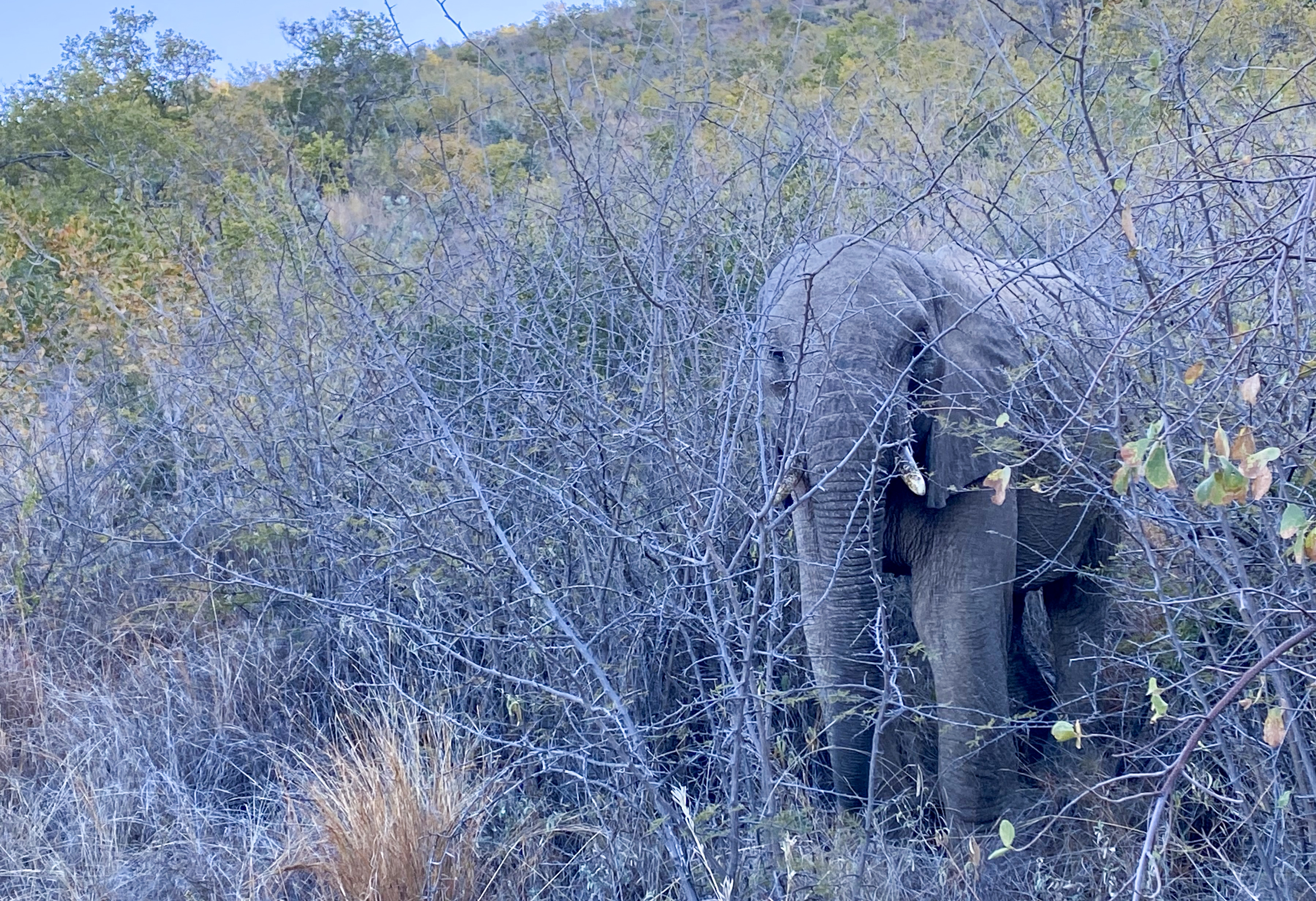
I felt this was the one I’d been wishing for. (Photo: Marie-Lais Emond)
Jonathan marvelled too at such good sightings in quick succession. “I think we have some good karma on this vehicle today.” I was still smiling when he noticed some giraffes, two particularly, fighting each other. Giraffe males, like most animals, prove dominance. However, one giraffe was pretty violent and actually downed the other. That was most unusual. We’d just been discussing how giraffe necks and breathing works in that they never lay their necks down unless they die. They don’t even have their heads down for long when they drink from a standing position. That giraffe was down and also had his neck on the ground, so forcefully had he been knocked off kilter. In a panic, Jonathan raced the vehicle closer. It proved to be true. Then, strangely enough, the giraffe didn’t actually die or rise again but struggled up into a seated position, still seeming a bit stunned and certainly alive.
“This is unique! I don’t know of this ever happening before,” a shaken Jonathan had said. While he gave them space, the giraffe stumbled up onto all fours. His opponent, having lost the desire to kill him, took to supporting him.
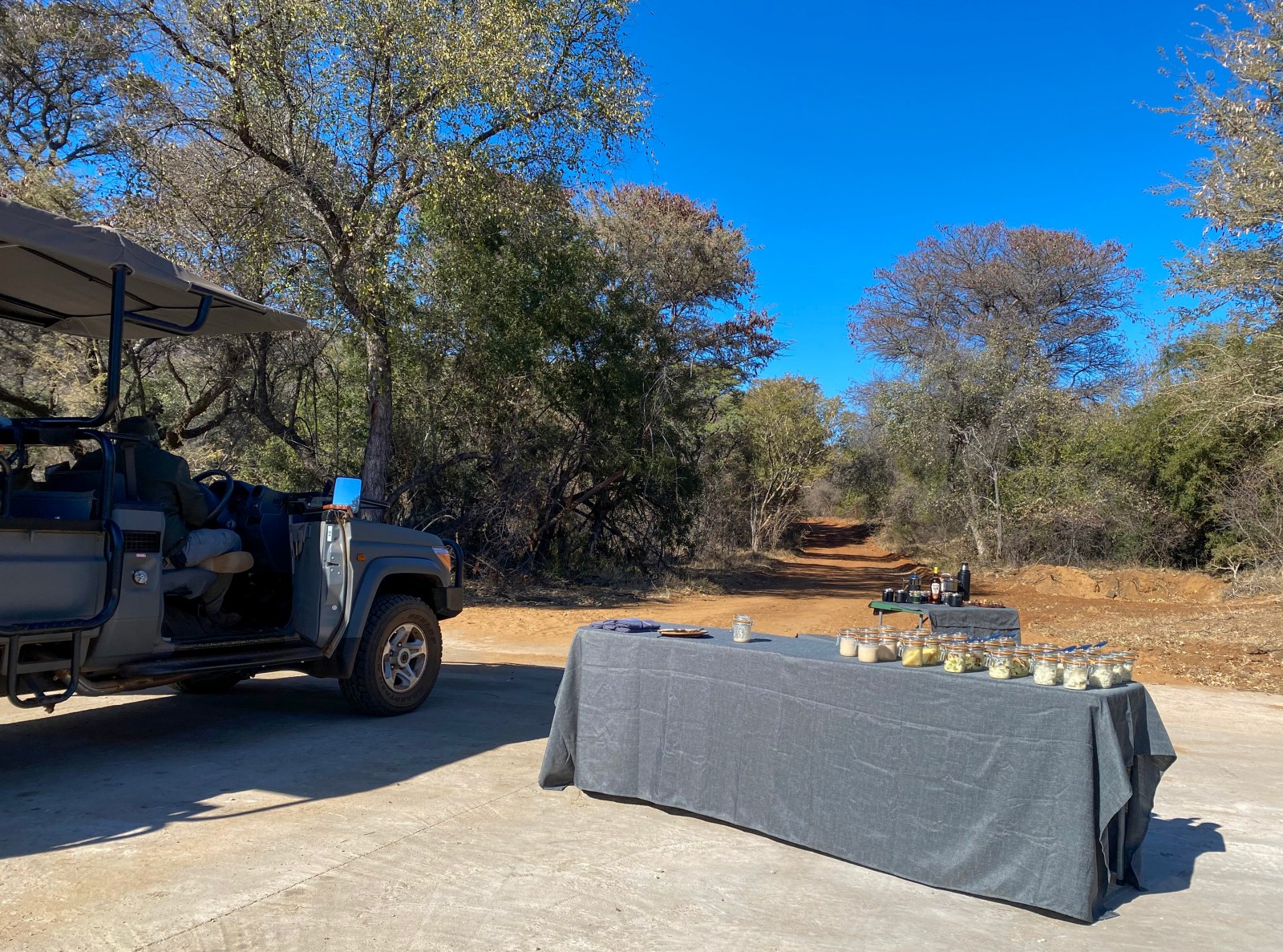
Jonathan halted the vehicle near what seemed like a table full of glasses or bowls. He set up a table too, filling it with coffee things. (Photo: Marie-Lais Emond)
A little stunned himself, more than the rest of us who were just hugely impressed, Jonathan rounded a bend in the road, came to a bridge section and halted the vehicle near what seemed like a table full of glasses or bowls. Wordlessly, he set up a table too and filled it with coffee things.
I am next to be stunned. Further off, near the actual riverbed, is Chef Chris Erasmus, from Foliage in Franschhoek, one of the five chefs of South Africa I hold in the highest esteem. He’s bending over one of two skottels. Flames are flickering, smoke is wafting. The air carries unmistakeable aromas. I am going to eat something by Chris Erasmus, made on a skottel at a bend in a dry riverbed in the Waterberg. And I’ve just recently had my elephant.
He and another chef, Mpulelo Ncube from Babohi’s kitchen, were darting back and forth, their skottels sizzling with ground beef patties, caramelising onions, softening pieces of pecorino-firm cheese, grilling bacon, adding fresh tomatoes and roundels of omelette on kitchen-made slit English muffins toasted inside. I admit I didn’t look into all the little mason jars that I suspect held fruits and yoghurts. I was concentrating so happily on what I had off the skottel in the wintry sunshine. Jonathan brewed up very hot Amarula coffees, against the icy temperatures and wind.
I’d been told before I left Jozi for Babohi in Qwabi that this very Chris Erasmus would, sadly, not be here while I was here. I’d so wanted to meet him. It was disappointing but I knew that chef Kristine Moodie would be here and I’d presumed they shared the same food tenets. Chris Erasmus is, as those who’ve admired his restaurant Foliage, even from afar, fanatical about using ultra-local things and using ingredients grown that lesser chef mortals haven’t got around to making much of. He is known as the great forager but he grows and sources immediately.
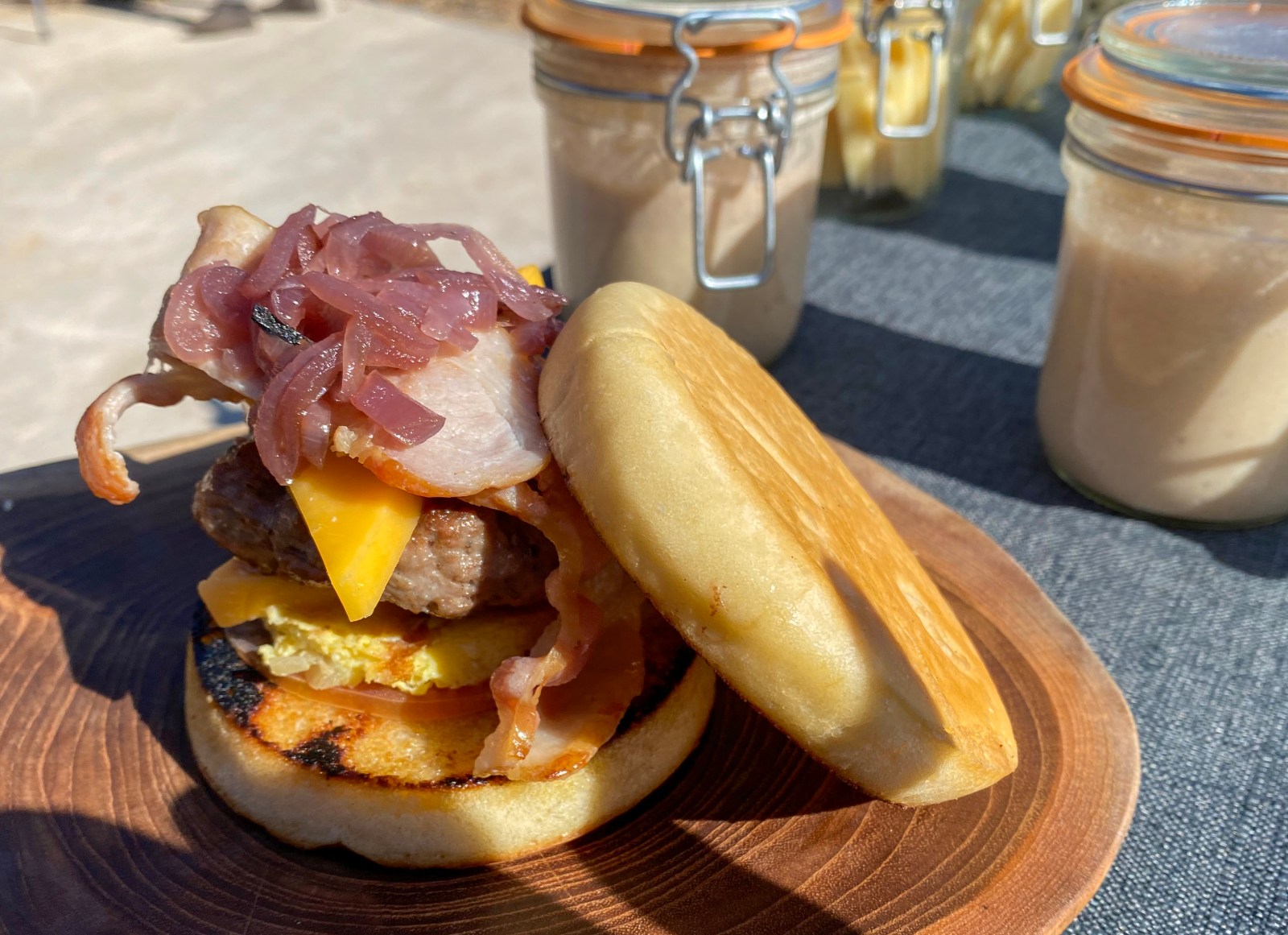
My brunch, Chris Erasmus style. (Photo: Marie-Lais Emond)
In this time of the food of excellent game lodges such as this beginning to have excellent chefs and kitchens, there are ethics to be encouraged, farm to table ones or veld to table ones. These are such ethics as Chef Chris already has and has probably always had, even before he worked at Noma in Copenhagen with Rene Redzepi. I would say that coincided with what Erasmus already believed about food, the use of what’s super-seasonal only, so local it could be underfoot, and making something of the pieces of plants and animals that are ignored by chefs who might not know how or care to work with them.
Interestingly, he was born in these parts, in Nylstroom, and did not look far for his early inspiration either. It was his mom’s vegetable garden. He worked quite a bit of the world, at other excellent restaurants, often starred, in London under Shane Osborn, USA, Brazil, Amsterdam, Salzburg, and Erasmus counts among these working in Franschhoek with Margot Janse and being head chef at Pierneef at La Motte, where I encountered his food. For seven years he put all his knowledge about working with that-day seasonal ingredients, the very local ones, into practice at his own place, Foliage. It was one of the World’s 50 Best restaurants. When Covid came up he turned what remained of his dream restaurant into a tremendous feeding scheme to help those without food.
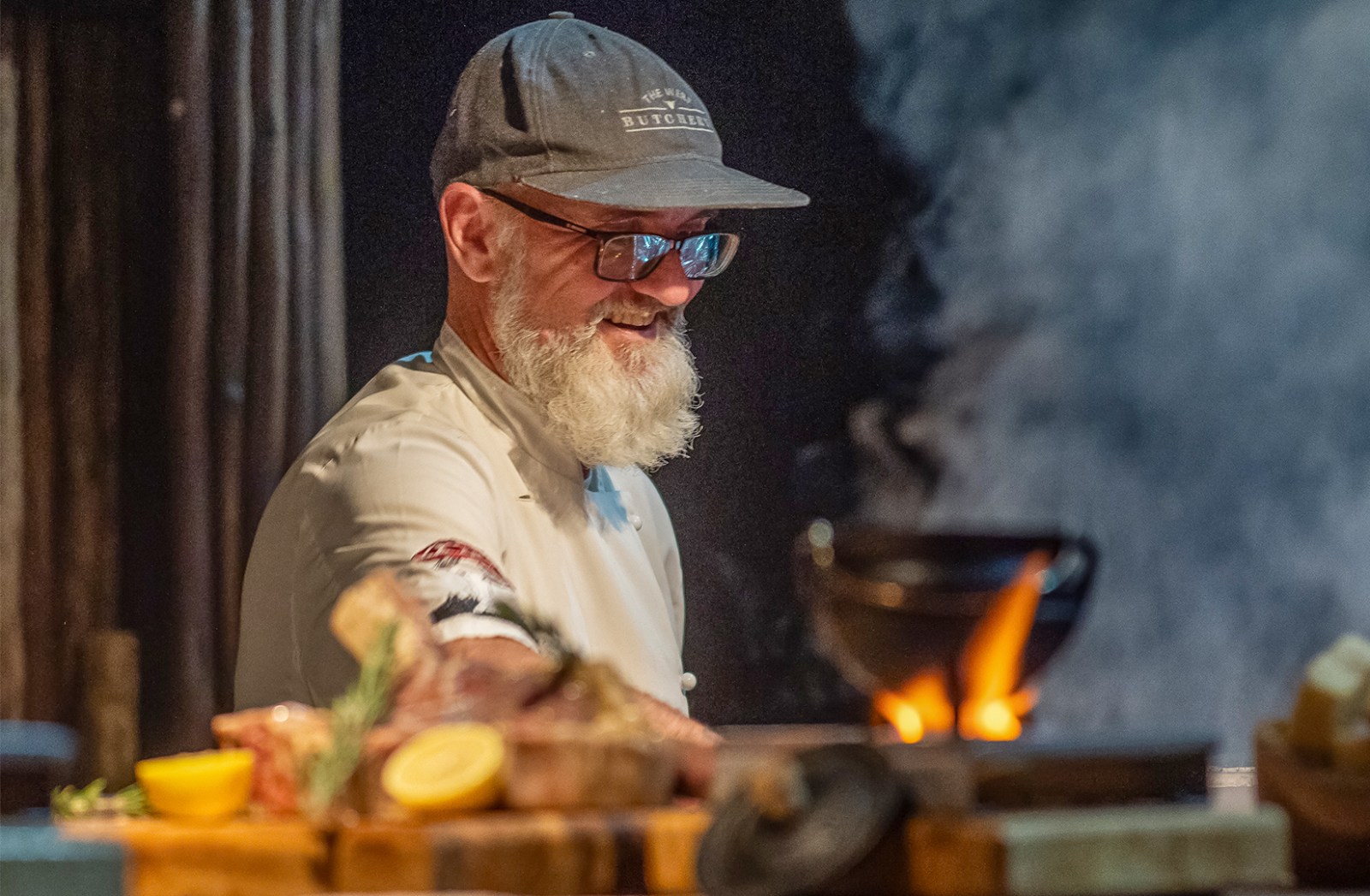
Chef Chris Erasmus was here, after all, had cooked and served up at my first dinner, outside. (Photo: Ryan Enslin)
Now the exemplary chef of these times has taken on the role of Food & Beverage curator for Newmark’s hotels and reserves. One project at hand is Babohi’s food experiences at Qwabi. After what I’d been told about not seeing him here, I was delighted and very surprised, after meeting chef Kristine Moodie, to find her and chef Chris Erasmus cooking and serving the food at the first dinner outside, with tables and chairs in the sand. He was, here, after all.
When I went up to get my main course at the fire counter, I heard “quince reduction” and speedily moved along to where Chris doled me a deftly grilled-before-me picanha with that dark, thick but silky reduction over it. He’d brought the reduction with him because he made lots while quinces were in season. Just that addition turned the way-better-than-ordinary to the utterly extraordinary. It’s what Chris Erasmus does.
“But wild ingredients are what we’d like to work with now. I’m learning more and more about these in this particular area, from this landscape. Oh, I can’t wait for spring for all the new veld berries, wild plums and marulas. The wild herbs here will come into leaf. Then we are already working with small farmers and very small farmers from just here, for their meats and vegetables. The tropical fruits in this area are phenomenal. There’s a lot, a lot, of wonderful food and ingredients from just here!”
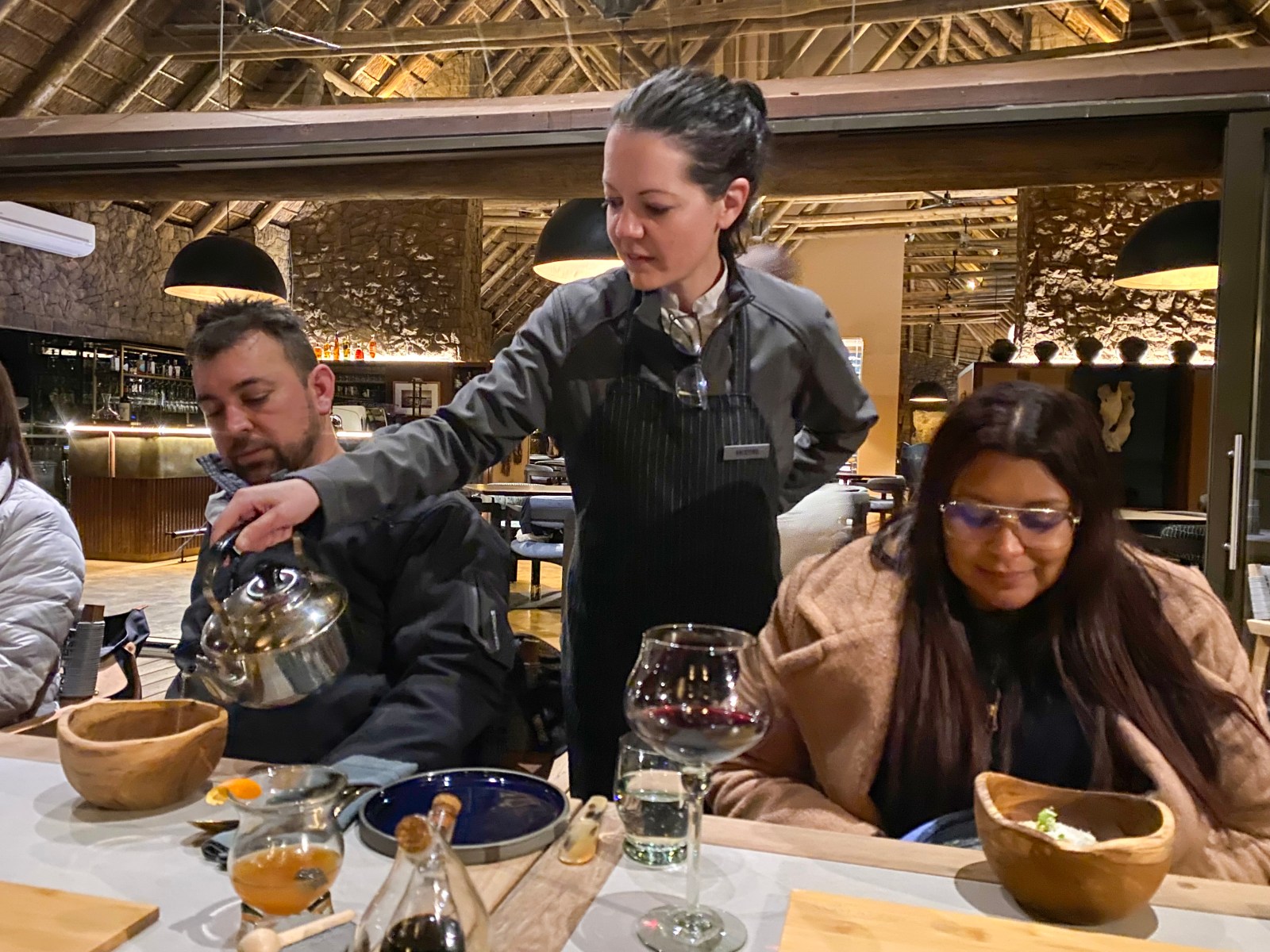
‘Chef Kris’, Kristine Moodie pouring the soup onto freshly picked ingredients in our bowls. (Photo: Marie-Lais Emond)
In the kitchen he‘s “Chef Chris” but Kristine is also “Chef Kris”. Both of them are teacher-type chefs, the kind of chefs who actually enjoy training new chefs, from scullers quite often. Certainly, not all chefs have that driven inclination. Chef Kris contributes her experience gained through her own very impressive local and international chef background and an appreciative consciousness of place, making the food experiences relevant without the bush kitsch.
The hibachi dinner on the last night was held indoors because the Waterberg temperatures were even lower than before. Soft drums announce all the dinners, another lovely sonic detail. They play until everyone stops talking and the chef can tell you what’s about to happen and you do feel it as an experience more than a meal. This evening, after the rather classy and freshly steaming hot soup course, the steam warmed what seemed to me like an eternally frozen nose from sitting in the vehicle with every part of my body covered — even my eyes by sunglasses that work as wind glasses but leave the nose exposed, except for an insubstantially gauzy scarf I had tied around my face like a silly bandit.
The hibachi was fun and we turned out to be nowhere near the great chefs we thought we were when we cooked for ourselves.
Inevitably the conversation goes back to bush sightings. The day of my father’s birthday elephant and the duelling giraffes was still the hero, because the drive after our skottel brunch had included a Meyers parrot, the brownish one common to the northern part of this country, eland and zebra and lion prints, including those of cubs, a rhino and an aardvark bum. It was dusky already when the aardvark impressed even Jonathan and scuttled off. That was a first for me, as was the parrot.
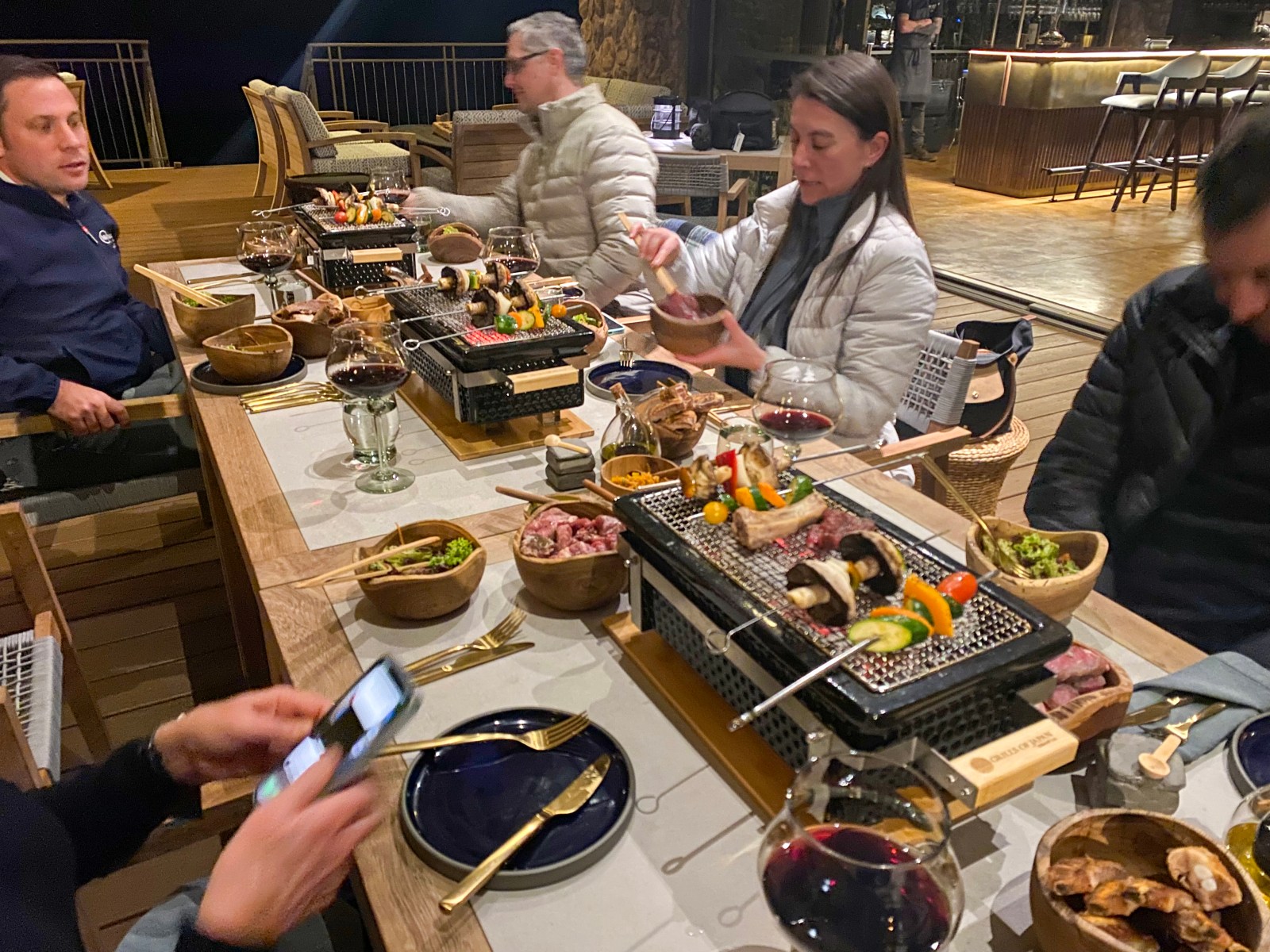
We were nowhere near the great chefs we thought we were when we cooked for ourselves. (Photo: Marie-Lais Emond)
I was wondering how much of the 11,000 hectares we’d covered. On the last morning, we covered areas unfamiliar, followed the lion tracks of yesterday that eventually led to a cleaned zebra carcass.
I knew I’d miss those pre-breakfast and high tea tables. I’d miss the beautiful scent of my room. When we’d arrived, at paper signing time, we had champagne poured for us and were asked to smell scented paper sticks passed around. There were two rounds, one of which was an aloe cucumber, the other a blend of rooibos and honeybush. I was the only one to choose the latter, which would be the scent of our rooms for the extent of our stay. To me, honeybush smells like sweet thatch. It was another lovely detail.
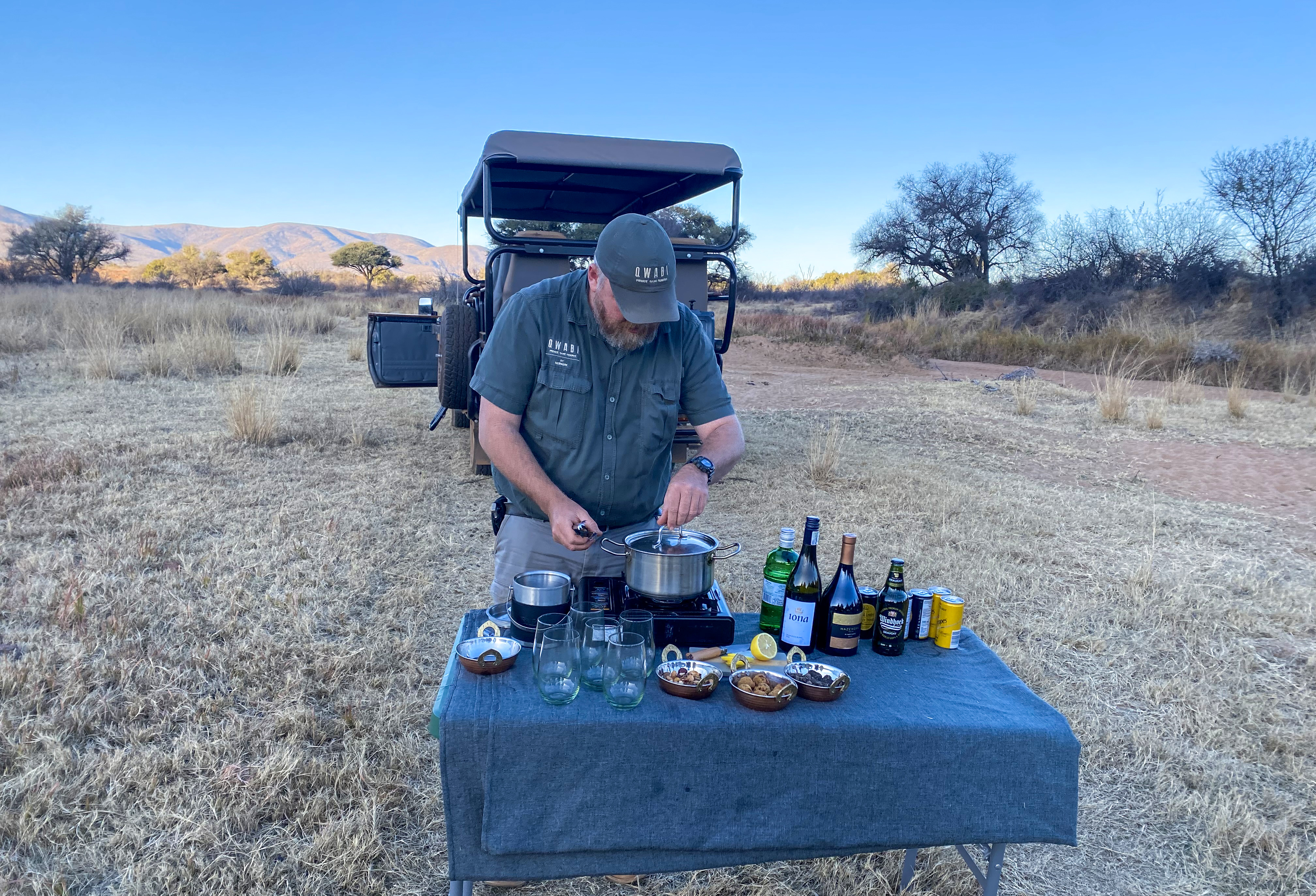
Our field guide Jonathan van Zyl is one of the very best and also has to play bush chef, producing hot snacks among the others every sunset. (Photo: Marie-Lais Emond)
On the game drives, Jonathan would have a pot and stove, apart from the drinks and snacks paraphernalia and produce hot popcorn to add to the Babohi kitchen’s great snacks and always lovely wines. I’d miss those.
The huge iron door sliders on the enormous castle-like door to my Leopard 2 froze shut on the last night and I had to be rescued by a porter who kicked the bolts open very dramatically. Then, when we really left on the shuttle, I with my still-frozen nose, we took away a thoughtful last taste of Babohi, as padkos in boxes.
Next to me was a very sleepy chef Chris Erasmus. Qwabi, but Babohi especially, is going to show urban and game lodge restaurants how veld-to-table works. I think it’s the one to watch. My wishes have already come true so long. DM
Babohi at Qwabi Private Game Reserve, Limpopo
The writer supports Nosh Food Rescue, an NGO that helps Jozi feeding schemes with food ‘rescued’ from the food chain. Please support them here.






 Become an Insider
Become an Insider
Comments - Please login in order to comment.